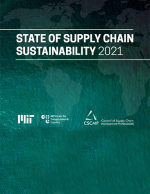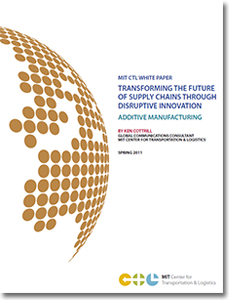Transforming the Future of Supply Chains through Disruptive Innovation
Additive Manufacturing - This white paper is part of a series of papers published by the MIT Center for Transportation & Logistics (MIT CTL) on disruptive technologies that could reshape supply chains over the next decade.
Additive manufacturing (AM) is the umbrella term for technologies that fabricate products by building up thin layers of materials from three-dimensional, computer-aided designs. A subset of these technologies, 3D printing builds objects on machines that “print” successive layers of materials such as molten plastic.
3D printing has evolved rapidly over recent years. Now it is being used to create product prototypes and to manufacture certain specialized items. From a supply chain perspective, however, the most exciting applications are in finished product manufacturing, where the technology is slowly gaining ground.
If 3D printing becomes a common feature of large-scale manufacturing operations, the technology will have a huge impact on all phases of supply chain management. Companies will find it much easier and more cost-effective to make customized items in limited quantities.
Global networks of 3D printing installations will give enterprises the ability to respond rapidly to shifts in market demand and to introduce new products quickly and inexpensively.
More versatile design processes could unleash a new wave of product innovation. In the longer term, the technology has the potential to redefine traditional manufacturing methods. The concept of making products in large, complex plants could become outmoded as companies adopt the more flexible AM model.
This white paper is part of a series of papers published by the MIT Center for Transportation & Logistics (MIT CTL) on disruptive technologies that could reshape supply chains over the next decade.
What’s Related




Favorites





